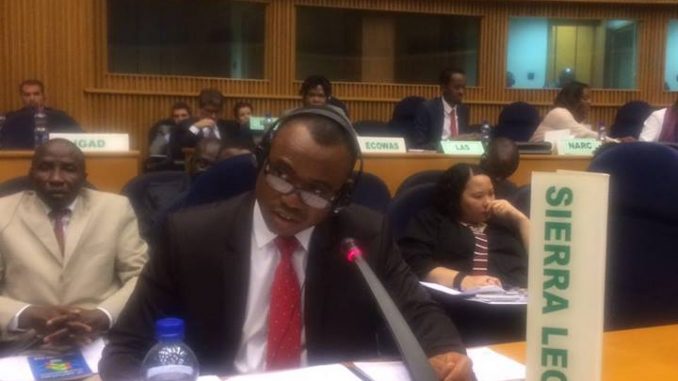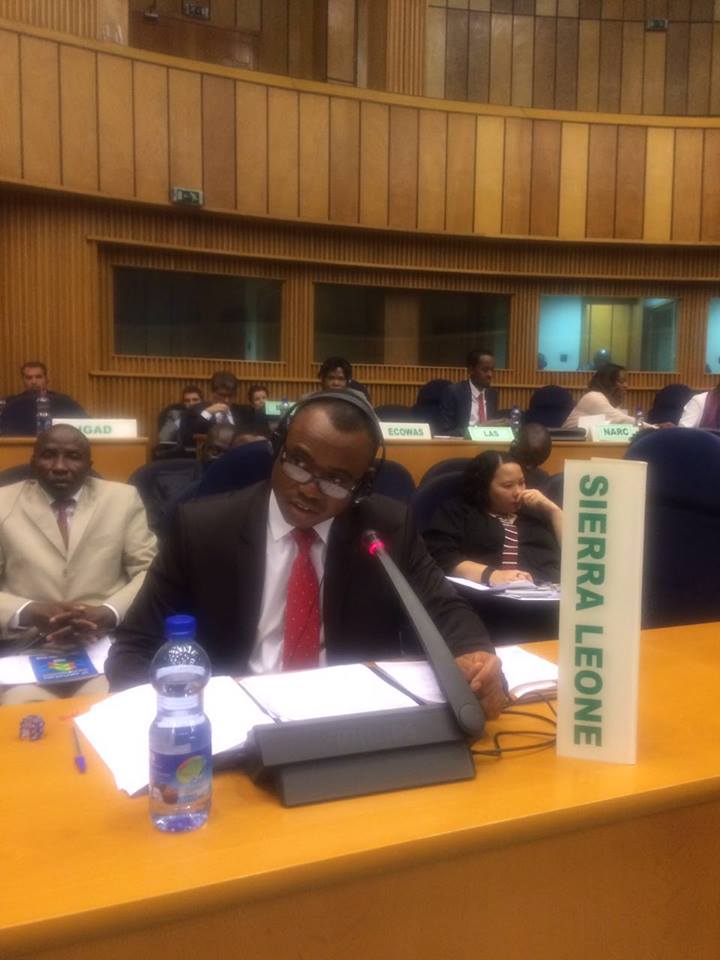
The issue of refugees in Africa and around the world has been a vexing problem that has been taxing the thoughts and the resources of world leaders , nations and international organizations. They are working round the clock to find tangible solutions to the plight of refugees.
When Sierra Leone’s Ambassador to the Federal Democratic Republic of Ethiopia and Permanent Representative to the African Union, His Excellency Mr. Osman Keh Kamara made a strong case for refugees during the Open Session of the Peace and Security Council of the African Union on the Management of Refugees and Internally Displaced Persons Camps and its Implications on Peace and Security in Africa today , Monday 17th October, 2016 at the African Union headquarters in Addis Ababa, it therefore struck a big chord.
Ambassador Kamara’s statement went down well with participants and observers during today’s session and many delegations made references to his presentation st whilst making their interventions.
See statement below.
STATEMENT BY AMBASSADOR OSMAN KEH KAMARA DURING THE OPEN SESSION OF THE PEACE AND SECURITY COUNCIL OF THE AFRICAN UNION ON THE MANAGEMENT OF REFUGEES AND INTERNALLY DISPLACED PERSONS CAMPS AND ITS IMPLICATIONS ON PEACE AND SECURITY IN AFRICA 17TH OCTOBER, 2016 IN ADDIS ABABA, ETHIOPIA.
Her Excellency Chairperson of the Peace and Security Council,
Excellencies Members of the Peace and Security Council,
Excellencies Member States of the African Union,
Excellencies, Ambassadors from partner Countries (China, EU, UK, USA, and France),
Distinguished Ladies and Gentlemen,
Let me start by congratulating you Madam Chairperson for convening this Open Session of the Peace and Security Council of the African Union on the Management of Refugees and Internally Displaced Persons Camps and its Implications on Peace and Security in Africa.
Madam Chairperson,
Abysmal economic situations, financial turmoil and unforeseen consequences of globalization and climate change had increased the number of migrants in search of security and opportunities. Similarly, rapid population growth and urbanization, poor governance, unemployment coupled with astronomical increase in prices had created tensions which had been compounded by conflicts, increasingly involving competition over limited resources. These phenomena had increased the number of refugees and Internally Displaced Persons across Africa and the world at large, especially in urban areas with far-reaching implications.
It is common knowledge that the global community normally provides swift response to refugees mostly fleeing from new conflict areas. Those who survive the difficult journey across the borders of neighbouring countries are provided with food, shelter and other basic needs by humanitarian organizations.
Once the exodus is over, funding dries up and essential services such as healthcare and education stagnate and deteriorate; in most cases, the refugees are left behind, obliged to spend several years in shabby camps, exposed to all kind of dangers and with serious restrictions placed upon their rights and freedoms. Many of the refugees and IDPs are effectively trapped in these camps simply because they can’t go home due to the ongoing war or serious human rights violations. Even those who may be fortunate to be resettled in developed countries, they may still face difficulties to integrate with the local population.
Cramped into overcrowded camps, forbidden from finding jobs, no access to land or realty, deprived of income and with no educational or vocational training to occupy their time, these refugee populations are afflicted by all kinds of social ills, including prostitution, rape and violence in the camps. Unsurprisingly, many take the risk of migrating to urban area or to another country, putting themselves in the dangerous hands of terrorists, human smugglers and traffickers. Refugee girls and boys suffer enormously in such circumstances.
Madam Chairperson,
The international community should not allow the human potentials of so many people being wasted while in refugee camps. It is imperative that steps are taken to ameliorate the plights of refugees and Internally Displaced Persons during their time in refugee camps.
Concerted efforts should be made to halt the armed conflicts and human rights violations that force people to flee from their countries and obliged them to leave in refugee camps. In this regard, the African Union and the Regional Economic Communities (RECs) should strengthen their mediation, negotiation and peacekeeping efforts. Above all, Council should adopt robust accountability mechanisms to punish perpetrators of war crimes and crimes against humanity. This decision should be submitted to the forthcoming session of the African Union Assembly for possible adoption.
Refugees’ problem is a problem of the international community as a whole, while funding may be scarce, every efforts must be made to improve the conditions of refugees. Particular emphasis should be placed on providing refugees in camps with livelihoods education and training. This will enable them to live a more productive and rewarding life and prepare for their future.
As a short term measure, while it is impossible to solve the world lingering refugee situations by moving all of the people concerned to the more developed regions of the world, the richer nations should demonstrate their solidarity with countries that host large numbers of refugees by resettling a proportion of them, especially those whose security and welfare is at greater risk.
As a long term measure, richer nations should invest in poorer regions by establishing value added industries and create more employment opportunities. The increase in socio-economic activities and employment opportunities will largely eradicate discontent and create the enabling environment for people to seek opportunities in their regions rather than risk their lives in the hands of human smugglers and traffickers to migrate to richer nations through the high seas to become refugees.
It is important to note that, refugees upon fleeing their countries and being hosted in other countries, they become governed by the laws of those host countries, the host agreement and other relevant international conventions and protocols relating to refugees. Of particular important, refugees must not involve in dissident and/or terrorist activities to undermine the security of the host countries and the continent as whole. The camp should not be used to plan attacks in complicity with radicalized groups against citizens of the host countries. We encourage the international community to provide adequate support to those countries hosting refugees and Internally Displaced Persons in the management of camps through capacity building and Intelligence gathering. The advance nations with high-tech cyber-security infrastructures should also collaborate in monitoring the illegal activities of refugees by sharing intelligence with the host countries and camp management officials.
In conclusion, it is worth noting that, the ultimate goal of UNHCR and other benefactors of refugees including host countries and camp management officials is to prepare for the safe and voluntary repatriation of refugees and IDPs particularly when the guns had been silenced and peacebuilding process had commenced in their countries of origin. The global community must not allow refugees/IDPS to remain in shabby camps and shanty settlements in perpetuity. We must establish more effective approaches for the repatriation and reintegration of refugees, thereby enabling them to benefit from and contribute to the peacebuilding process.
I thank you for your kind attention.



